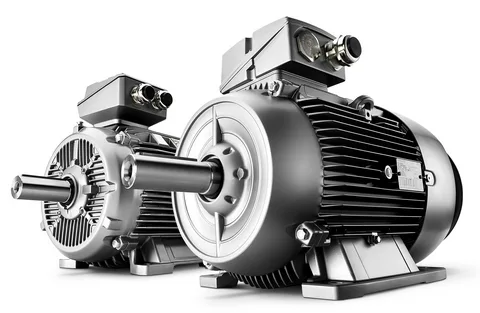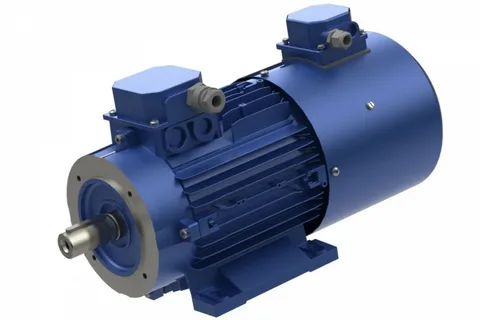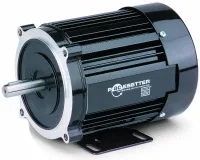Inverter Electric Motor | How They Function and Their Purpose
Inverter electric motors have become critical tools for conserving power in the modern world. From industrial equipment to home appliances, including air conditioners, inverter motors are gaining popularity because of their ability to optimize power consumption.
But what is an electric inverter motor? What sets it apart from an ordinary motor? What advantages does it have? In this article, we will address these queries and provide insights about how motors work with inverters and their innovative technologies.
What is an Inverter Electric Motor?
The term “inverter electric motor” refers to a type of electric motor that works with an inverter for speed control purposes. An inverter in this sense is regarded as a device that alters the speed and power provided to the system by changing the frequency and voltage of power given to the motor.
The inverter receives an alternating current (AC) input and transforms it to a specific output which improves the efficiency of the motor. In applications that require precise control over variable speed, such as HVAC systems, pumps, and fans, inverter electric motors are widely used.
To put it simply, an inverter motor allows for flexible and efficient use of a motor because it controls the speed and torque so that energy is not wasted.
What is the Difference Between Inverter Motor and Normal Motor?
Unlike normal motors, the main distinguishing feature of inverter motors is the method of controlling the speed and power sent to the motor.

Normal Motor:
Fixed Speed: Induction motors are one of the examples of traditional electric motors, which are driven by a supplied electricity frequency. These motors have a ‘start and stop’ approach, wherein they operate at a set speed until they are powered off.
No Speed Control: A significant drawback of this type of motor is that it cannot adjust its speed while running. This means that these motors can be inefficient in energy usage, especially when running at full speed, while lower power is required.
Lower Efficiency: Typical electric motors waste energy because they continuously rotate at a set speed, regardless of the operating load – whether fully loaded or partially loaded.

Inverter Motor:
Variable Speed: Inverter motors are primarily distinguished by their capability to change speed. Their operation is based on changing the frequency and voltage of the supplied electricity, and they can operate the motor at different speeds depending on need.
Energy Efficiency: The inverter motor operates efficiently because it can be designed to change rotational speed according to the loads. This makes them much more energy-efficient than conventional motors.
Accuracy: The capability to control torque and/or speed of inverter motors makes them ideal for variable speed drives in HVAC equipment, pumps, conveyors, etc.
Simply put, inverter motors are more advantageous than ordinary motors for performance and energy-saving reasons because the former can change speed and power flexibly while the latter cannot.
What is the function of an electric inverter?
This is a device that is used to transform electric current (DC) or alternating Current (AC) to Alternating current (AC) with a certain frequency and voltage. It ‘inverts’ the power to the form required by the motor.
The inverter doesn’t only make a type of power change. It also enables accurate form of motor speed and torque control by regulating the power frequency supplied to the motor. This allows the motor to have the flexibility of meeting varying power demands without unnecessarily wasting power.
In the case of an electric motor driven by an inverter:
– The inverter governs the power frequency.
– The weeper turbine motor can be operated from rest to full speed, and the acceleration is smooth.
The motor does not need to always run at full speed, hence energy is, efficiency improved, wear and tear reduced, and the lifespan of the motor prolonged.
Inverter technology also allows motors to run and perform more smoothly with less vibration when compared to other more traditional motor systems.
What Is The Advantage Of Inverter Motor?
Inverter motors are some of the most advanced technology in today’s world because they enable a range of applications. In order to control functions such as torque, speed, and acceleration, an inverter motor is attached to a system called a controller.
An inverter motor comes with perks, these include:
1. Electric Savings
The main argument for purchasing an inverter motor is because of how energy efficient it is. Compared to normal motors, inverter motors utilize less energy. Being one of the most complex machinery in the world, HVAC units can conserve tremendous energy.
Operating on a variable load application, inverter motors can cut costs by 30-50% compared to using traditional motors.
2. Operating Expenses
Due to their marked up cost, normal motors will always take priority over inverter motors. However, inversion motors guarantee savings on energy, repairs, maintenance and service in the long run. Inversion motors have a longer life span, which means less frequent replacements.
3. Enhanced Performance and Accuracy
Inverter motors are designed for precise speed control, enabling them to perform optimally in processes that require different speeds or delicate movements. An example of this is an industrial inverter motor used in a conveyor belt system that requires speed changes according to the supply of materials. This precision leads to improved productivity and system performance.
4. Less Strain
Inverter motors also have the added advantage of controlling speed based on load, alleviating the need to run at full capacity which decreases stress on the motor parts. The ability to start and stop smoothly also alleviates the stress from rapid changes in force, greatly increasing the life of the motor.
5. More Efficient
In terms of vibrations and noises emitted, inverter motors possess the ability to produce a smooth operation. This feature makes inverter motors perfect for use in applications that demand quiet and efficient operations like air conditioning, elevators, and pumps.
6. Advantages For The Environment
Inverter motors also lead to a reduction in carbon emissions by improving efficiency and energy consumptions. They use less power which leads to a smaller energy footprint compared to inefficient motors. Inverter technology is a good solution for companies striving for greater sustainability and supporting energy policies.
Less Common Uses Of Inverter Motors
The efficiency and precision control of electric inverter motors helps in a variety of industries.
HVAC Systems: Inverter motors are widely used in air conditioning units, heat pumps as well as in ventilation systems to control demand. This requires adapting the airflow to achieve better cost and energy efficiency.
Pumps: In energy conservation facilities such as water treatment plants, inverter motors control the pump speeds in relation to the required flow rate. This minimizes energy expenditure while prolonging the equipment’s life span.
Conveyor Belts: Used in manufacturing and material handling, inverter motors streamline energy efficiency by controlling the speed of conveyor belts to ensure they operate smoothly.
Electric Vehicles (EVs): Inverter motors in electric vehicles control the amount of power given to the motor, influencing the effectiveness of acceleration, braking, and regenerative braking.
Fans and Compressors: In the industrial and commercial sectors, inverter motors enable the modulation of fan and compressor speeds to enhance efficiency while conserving energy.
Forecast of Inverter Electric Motors
With the shifting focus towards energy saving, inverter electric motors are becoming increasingly important technology. They provide great savings in energy costs, better functioning, and increased longevity of the motor life when compared to traditional motors. Inverter motors used in electric motor technology are paramount in HVAC infrastructure, industrial equipment, and even in household appliances.
If your goal is to lower energy usage, reduce spending, and heighten the efficiency of your motor-powered equipment, then an inverter electric motor would be the right choice for you. With advancements in technology, inverter motors will prove more useful over time, reinforcing their status as a critical feature of contemporary electric frameworks.




Post Comment